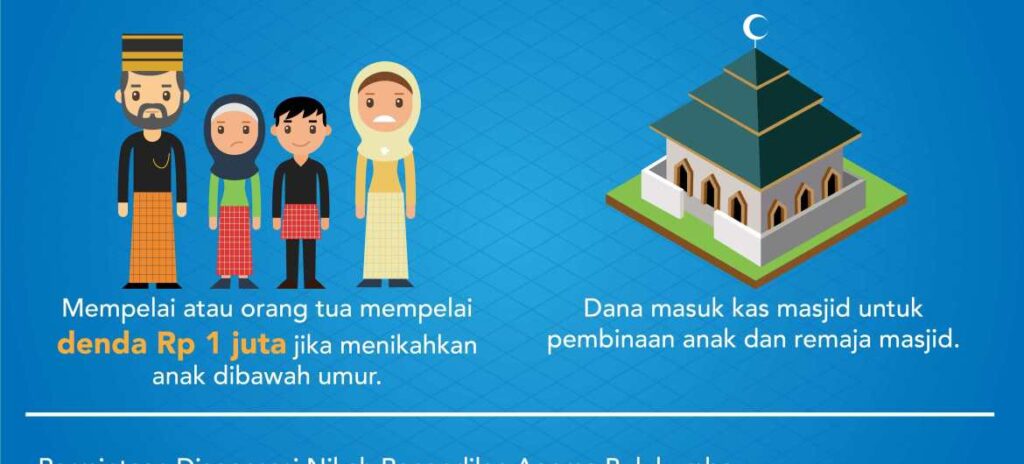
What rights are taken from a child when forced to marry while still immature? This has become a complicated issue in Indonesia. Child marriage rates in several locations, one of them South Sulawesi, are still a concern, not to mention a negative situation that ruins the child’s happiness.
This concern has had an impact in a place called Bialo village, located about three kilometres from Bulukumba regency in South Sulawesi. Various undesirable events resulting from child marriage have prompted the Head of Bialo village, Agusriadi Maula, to issue a regulation to prevent it. The resulting village regulation, no. 07/2018, is the second such regulation in South Sulawesi. In January 2018, Bone regency became the first to issue a village regulation similar to the Village Regulation on Early Childhood (Prevention of Child Marriges), issued in Mallari village.
Explaining about the village regulation, Agusriadi said that in 2016 there were two child marriage cases in his village, followed by three in 2017, and two more in 2018. In addition, a number of cases in the neighbouring village are enough to worry him. “There were eight cases of mothers dying during childbirth. One of them was in Jalanjang subdistrict, where the 15-year-old mother died after giving birth, meaning that she must have married at 14 years of age. I gathered the residents together, and explained that I wanted to develop village regulations to prevent child marriages, so that the case of Jalanjang village would not occur here,” Agusriadi said at the village office (07/02/19).
Data obtained from the Bulukumba Religious Court showed an increase in the demand for marriage dispensations over a period of five years. Annually from 2014 to 2018 the number of marriage dispensation submissions was 28, 53, 56, 59 and 88 respectively. According to Hasmiani, one of the Bulukumba Religious Court employees, the average age proposed for marriage dispensation is 16-17 years old for boys and 12-16 years old for girls.
Considering data collected from the South Sulawesi Central Statistics Agency (BPS) during the last three years for the Bulukumba region, in 2016 about 15 girls under 16 years old (38 percent) and about 22 (83 percent) of girls 16-18 years old were married. In 2017, the corresponding figures for girls under 16 years old and girls 16-18 years old respectively were about 17 (26 percent) and about 16 (35 percent). Finally, for 2018, the figures were about 8 (56 percent) and about 23 (86 percent).
Over a period of two weeks, Agusriadi invited the Bulukumba Health Office and Religious Court to discuss the draft village regulation regarding child marriage. About 70 residents representing each family were also present. Agusriadi also invited Misra, one of those who had married early. “At first Misra did not want to attend, but I told her, we wanted to provide a real-life illustration, and explained that in Bialo village we are a little traumatised, even though in fact we do not yet have high numbers of child marriages. But we hope that this will not happen in 2018,” Agusriadi added.
After that, the draft village regulation was corrected and finalised. Agusriadi mentioned that the regulation was interesting because of the phrase “marriage prevention.” “Well, for some Bugis people, marriage is considered to provide sustenance; so it’s as if we are obstructing people’s sustenance (Dalle’na or sustenance). Even at Friday prayers, a parent asked me if it was forbidden for people to be married, so I explained that what was banned was only marriage under 17 years old,” he added. Agusriadi then explained to the residents that the ban was so that children could still go to school, and still be able to work well. If they have to take care of their own children as well, then those things will not be easily achieved.
There are other reasons, according to Agusriadi, for developing the draft village regulation. Bialo village, said Agusriadi, has a population of 3,036 persons, with an area of 640 hectares, 509 hectares of this area being devoted to rice fields. This situation creates vulnerability to social issues. “In 2015-2016 we found children here sniffing glue. This has occurred because children here are easily influenced by others from outside their village; the city is close by and city children can easily travel to the village. In addition, there are several tourism destinations located near the village so we are raising concerns that must be anticipated, he added. He reminded the adolescents and children in his village to get along with and be pleasant to anyone. However, the characteristics of the people of South Sulawesi, the people of Bugis, Makassar, and Mandar must be preserved.
In November 2018, the draft village regulation was passed into a Village Regulation on Child Marriage Prevention. Consisting of six chapters and 17 articles, the main point stated in Article 2 mentions the intent and purpose of this village regulation, as a judicial basis for the village government to make efforts to prevent school drop-out due to child marriages. Uniquely, on the penalty point, in Article 15, the bride/groom or parents will be subject to a penalty amounting to Rp1 million if found to be involved in child marriage. This fund will then be included in the mosque’s funds to be managed and utilised in the best interests of children and adolescents. In Article 12 it is also confirmed that marriage can take place only if the prospective bride and groom have completed 12 years of education, unless the prospective bride is at least 16 years old, and the prospective groom at least 18 years old.
The interests of children intended in Article 15 are explained in Article 8, namely the village government must facilitate the development of children and their potential by forming institutions or forums for children; providing facilities and infrastructure for children’s activities; facilitating the participation of children in children’s group activities; and conducting training and socialisation of reproductive health for children and adolescents.
“At first we set Rp50 million for the penalty, I took this idea from the regency government cigarette penalty, but nothing was ever done; even if someone smoked, who would dare to levy a fine of Rp50 million? So we don’t use that amount, and thereby avoid becoming a laughing stock,” he added. Agusriadi said that the Rp1 million penalty was set not really to apply the penalty as a whole or to levy fines, but more to act as a lesson for residents. “I am committed to not giving marriage certificates. This is not about sanctions but how to make people realise not to marry off their underage children,” he remarked.
Since the issuance of the regulation in November 2018, Agusriadi considered it to be still too early to evaluate its success or otherwise. “However after I checked yesterday the data requested for the marriage certificate, already delivered to the mosque, perhaps the community will be cautious. Perhaps in 2019 we will see if people are starting to understand,” he explained.
In addition to the head of the hamlet and midwives groups, the role of children in the prevention of child marriage will also be enhanced in the form of children’s development in the community. “In our village, we are optimistic because we continuously monitor the level of education and capacity; working on children’s development so that they learn to appreciate themselves and their village,” Agusriadi added.
He hopes that this village regulation can be applied also in other villages, and that other village residents can also become aware of the negative impacts of child marriage. So far, he remarked, if there is child marriage, women are invariably targeted. “Women must respect themselves. In 2019 I hope that not only Bialo village but other villages will also establish a village regulation that is in favour of children,” he concluded.
The Head of the Bulukumba Women’s Empowerment and Child Protection Agency (DP3A), Umrah Aswani, responded to the existence of this village regulation. Coordination with several institutions continues in relation to the issue of a child’s age which is still often falsified so that marriage can take place. “That is why many parents ask for a trial session, because in the village the certificate will not be given if minimum age requirements are not met,” she said at the office of DP3A Bulukumba (11/2/19).
The number of marriage dispensations and marriages in the Religious Court has increased, because of pregnancies out of wedlock. In addition to the village regulation “born” in Bialo village, Umrah also mentioned that several areas in Bulukumba are getting ready with similar rules. “We also received a similar instruction in Jalanjang village; this is still in draft form,” she remarked.
Currently, the Bulukumba government is focusing on child marriage prevention. Therefore, they hope that replication will be carried out by other villages. In addition, activities will be arranged for children to occupy their minds. “I want there to be activities in all places, with an active village head to reduce the marriage rate of children. I have encouraged them to work on making changes,” Umrah added.
Victim Engagement in Village Regulation Socialisation
For the supervision and implementation of the village regulation, Agus involved the village heads and midwives who socialised the information in four hamlets, namely Mattoanging, Barabba, Kessi, and Toroliya hamlets. “These people maintain and campaign for the village regulation. There are four persons, and each month they go to the hamlets, conveying the information about the regulation to homes through the activities of Pospindu and Posyandu,” he added.
In addition, the socialisation also involves children and some of those who married early. Misra (27 years), one of those who married early, felt that she did not want her own experience to be experienced by other girls in her village. While still in Class 3 of senior high school, she was forced to marry at the age of 17 years old. She has been married for ten years and currently has two children. The third child of seven siblings, Misra had to be married because of economic problems. “For every tuition fee payment, mama borrowed from her husband. Finally because of the frequency of loans, her mother’s husband offered to marry me to his child,” recalled Misra at the Bialo Health Centre (8/2/19). She had planned to run away from home, but because her mother was unwell, she decided instead to honour the wishes of her mother and husband’s family.
This experience encouraged Misra to educate her family and her neighbours. Misra said that one of her cousins would be married underage because of being found dating. “But I told her parents to let her finish school, and I told my cousin, if she was truly in love, surely she could wait until she finished school,” she remarked.
Fortunately, Misra’s advice was accepted and her cousin was married after graduating from school. Misra often gives advice to her neighbours who intend to marry their children because they are found to be dating, often reminding them that children do not have the mental maturity to marry. The problem that most often appears in adolescents, added Misra, is the association of adolescents that make parent a siri’.
“Often children tell stories about how their friends’ parents forced them to marry because their daughters often went away for days without coming home, so finally the parents decide the child should marry rather than bringing shame to the family,” she added.
Misra is also often confided in by secondary high school students about engaging in sex during adolescence, even concerning the topic of the contraceptives they used to avoid pregnancy. “But a relationship like that will surely lead to pregnancy; that kind of association is scary especially if involving cellphones,” she added. Usually, Misra also asks them to consider the consequences of an early marriage; even though they may be married to their boyfriend, when they have children while themselves still very young they will experience a heavy burden of household work.
According to Misra, the presence of this village regulation could save children from dropping out of school. In addition, the divorce rate could also be suppressed. “Because children who are married do not have deep thoughts about marriage, so they must be stopped,” she concluded.
Besides Misra who became involved in socialising this village regulation, the village midwives also requested the assistance of Radia Asyir (27 years old). Busy working with mothers and children at Posyandu (8/2/19), Radia explained the socialisation of the Village Regulation on Child Marriage and the importance of care during pregnancy. Radia belongs to a round-the-clock group working together with three other midwives. “We are socialising the village regulation because by suppressing child marriages we can suppress factors such as risks during pregnancy,” she remarked.
She also mentioned that child marriage affects psychological and physical factors; in these cases we have people who are married but cannot take care of themselves or others, and we have pregnant girls who are indifferent to their condition. She gave the example of a young mother (Suluh) in one of the hamlets who could not make her own decisions because of her youth. “Yes, I always ask for an opinion from her husband, even though it is for her own interest. For instance, she is prohibited from involvement in her husband’s family planning program, even though it is important to her,” she added.
Radia recounts that in general the girls are young mothers or G1 (experiencing their first pregnancy). “There is one person in the village aged only 16 years who is married and already has four children. When she was pregnant, she did not really understand how to take care of the children and take care of her pregnancy, and always asked for the opinion of her husband or parent,” she explained. Socialisation of the village regulation also addresses this type of situation. “We started the socialisation program early this year. It is important to reduce the incidence of child marriage. Current problems are no longer due to economic factors but involve factors related to the use of social media. Relationships are freer, causing parents to fear child pregnancy, with a case of pregnancy out of wedlock in 2018. Boyfriend and girlfriend, married and both at the same senior high school bench,” she added.
Radia realised that the existence of this village regulation encourages parents to keep an eye on their children to prevent careless use of social media. The approach they take focuses on parents as well as children. “Parents can understand their children, understand what they want, even be able to position themselves as friends, so children are not anxious when they want to discuss something,” she explained.
For children, Radia provides an understanding of reproduction, and of what adolescents should and should not do. Radia continues to work with the community to instill confidence in the importance of the village regulation. “I am optimistic that this village regulation will be accepted by the community,” she concluded.
Community Optimism
Some residents with young children have responded positively to the presence of this village regulation. Saidah (46 years old) who has two adolescent children feels that marriage is not recommended. “The children’s minds are not fully developed (they are still mentally immature) and the girls’ reproductive systems have not reached maximum fitness/strength. In addition, early marriage means that their schooling must be interrupted, and early divorce is likely,” she explained.
Saidah felt that this village regulation was important as a means to convince parents not to immediately think of marrying off their children. “Let the child mature and be able to work first, with a stable household economy,” she remarked. She considers that it is important to motivate parents and provide them with guidance on how to direct and control their children. “There are several cases of children who are married because the girl became pregnant out of wedlock; everyone wants to prevent this,” she added.
Saidah also helps to socialise this village regulation to her neighbours. She hopes that there will be no more underage marriages, and no more school drop-outs or infant mortality because of underage marriages.
It’s different with Sapiah who also married early. Having dropped out of senior high hchool herself made her think of marrying off her child if someone proposed. However after her relatives, Husni and Ana, announced the development of this village regulation, Sapiah was pleased. She recalls that one of the rules also states that if a child is forced to marry, then the pair will be separated first until they are both more than 18 years old. “This village regulation is good,” explained this sand worker.
Fear of a Social System Disorder
Tomy Satria Yulianto, the Vice Regent of Bulukumba who is also a social observer, mentioned in several places and at several events that this issue is indeed enough to seize public attention. At his office (8/2/19) Tomy mentioned that child marriages happened because of the fear of damage to the social order.
“One of our concerns is the human development index, one aspect of which is education level; there are people who do not continue their education because of marriage. Last month we campaigned to stop child marriage,” he explained.
Yes, I hope this becomes an entry point for building awareness about stopping early marriage. From the perspective of regulation, the marriage age of children opens a new discourse. But for example we need to establish specific local regulations, and this is not a problem. Because in some small areas in Bulukumba, people don’t care about the state marriage regulations.
“There is no national alarm mechanism to break the chain; usually we don’t know about an underage marriage until it has already happened because these marriages take place secretly with only close family members being in the know,” he added. He saw that there was no adequate instrument to anticipate early age marriage other than awareness.
“Considering what has been done by Bialo, at least it has raised awareness, because certainly the village Imam, paid by the village, will think twice about marrying an underage child,” he remarked. Preventive efforts must indeed take place at the village level. “We will ask PMD to scale up, from the process carried out by the village Bialo. The initiative needs to be replicated at other village levels, especially in villages where many early marriages are likely to take place,” Tomy added.
Later, there will be a reward and punishment system related to public services provided to citizens concerning early marriages. “I want to encourage this model to be used at the village level because early age marriages are very difficult to track; there is no system to alert us to them,” he remarked.








